新概念英语第二册第02课
新概念英语第二册第二课
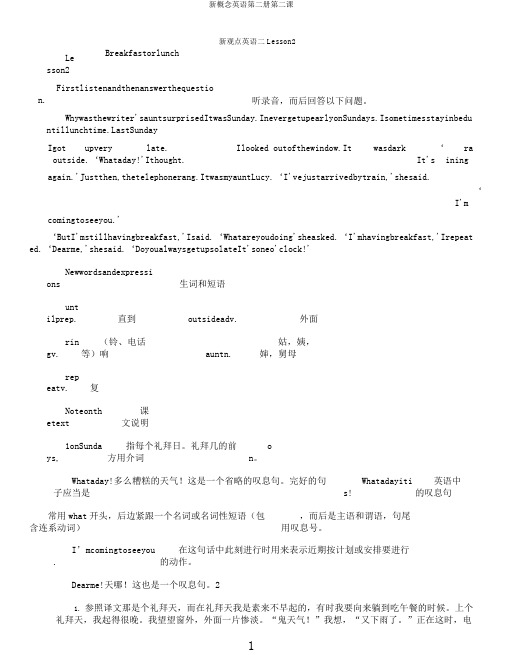
新观点英语二Lesson2Lesson2BreakfastorlunchFirstlistenandthenanswerthequestion.听录音,而后回答以下问题。
Whywasthewriter'sauntsurprisedItwasSunday.InevergetupearlyonSundays.Isometimesstayinbedu stSundayIgot upvery late. Ilooked outofthewindow.It wasdark outside.‘Whataday!'Ithought.‘It'srainingagain.'Justthen,thetelephonerang.ItwasmyauntLucy.‘I'vejustarrivedbytrain,'shesaid.‘I'm comingtoseeyou.'‘ButI'mstillhavingbreakfast,'Isaid.‘Whatareyoudoing'sheasked.‘I'mhavingbreakfast,'Irepeat ed.‘Dearme,'shesaid.‘DoyoualwaysgetupsolateIt'soneo'clock!'Newwordsandexpressions生词和短语untilprep.直到outsideadv.外面rin gv.(铃、电话等)响auntn.姑,姨,婶,舅母rep eatv.重复Noteonth etext课文说明1onSunda ys,指每个礼拜日。
礼拜几的前方用介词on。
Whataday!多么糟糕的天气!这是一个省略的叹息句。
完好的句子应当是Whatadayitis!英语中的叹息句常用what开头,后边紧跟一个名词或名词性短语(包含连系动词),而后是主语和谓语,句尾用叹息号。
新概念2上册
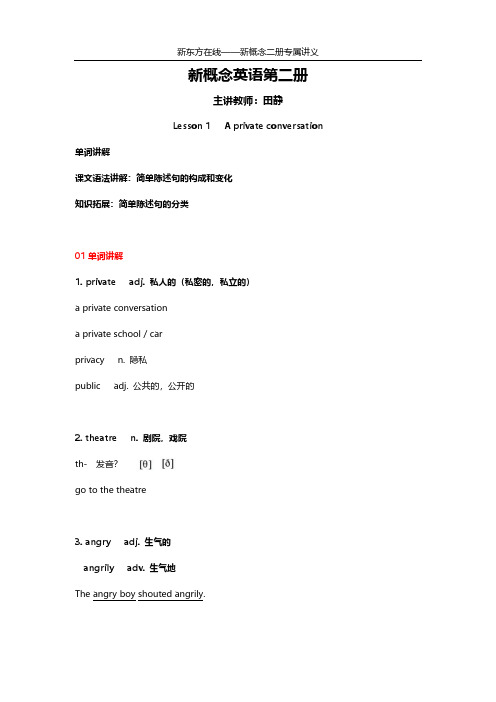
新概念英语第二册主讲教师:田静Lesson 1 A private conversation 单词讲解课文语法讲解:简单陈述句的构成和变化知识拓展:简单陈述句的分类01单词讲解1. private adj. 私人的(私密的,私立的)a private conversationa private school / carprivacy n. 隐私public adj. 公共的,公开的2. theatre n. 剧院,戏院th- 发音?go to the theatre3. angry adj. 生气的angrily adv. 生气地The angry boy shouted angrily.4. loudly adv. 大声地loud adj. 大声的5. rudely adv. 无礼地,粗鲁地rude adj. 无礼的,粗鲁的6. attention n. 注意·pay attention to sb. / sth.We pay attention to the new words. They did not pay any attention. ·May I have your attention, please? ·Attention, please.·attract / catch / draw one’s attention02课文语法讲解:简单陈述句的构成和变化1. 简单陈述句的构成——核心①名词+ 动词(n. + v. )主语+ 谓语例1:Birds fly.例2:We walk.②主语+ 谓语v. + ?例1:I have ? I have a seat.例2:The play was ? The play was interesting.2. 简单陈述句的构成——语序你吃苹果。
苹果吃你。
你苹果吃。
例1:The policeman arrested the thief.The thief arrested the policeman.3. 简单陈述句的变化例1:Boys talk.Boys were talking.Lovely boys were talking loudly.Yesterday after class lovely boys were talking loudly about the exam in the classroom.例2:I go.I went.I went to the theatre.Last week I went to the theatre.例3:I have a seat.I had a seat.I had a very good seat.例4:简单陈述句的变化——谓语动词的变化They were talking loudly. (时态)It was bought by my grandfather. (语态)I could not hear the actors. (情态+否定)I did not enjoy it. (时态+否定)(课文…)Last week I went to the theatre.I had a very good seat.The play was very interesting.I did not enjoy it.A young man and a young woman were sitting behind me. They were talking loudly.I got very angry.I could not hear the actors.I turned round.I looked at the man and the woman angrily.They did not pay any attention.In the end, I could not bear it.I turned round again.”I can’t hear a word !”I said angrily.”It’s none of your business,”the young man said rudely.“This is a private conversation !”练习:连词成句词:the film;I; enjoyed;yesterday句1:I enjoyed the film yesterday.句2:Yesterday I enjoyed the film.词:games; played; yesterday; in their room; the children; quietly 句:The children played games quietly in their room yesterday.03 知识拓展:A 简单陈述句的分类They meet. 主谓I love you. 主谓宾I tell you a secret. 主谓双宾I find you interesting. 主谓宾补You are beautiful. 主系表比较:They meet. 主谓vi. 不及物I love you. 主谓宾vt. 及物You are beautiful.主系表系动词·系动词:①be动词(单独出现)②get become turn go grow “变得”③look sound smell taste feel “看起来/听起来/闻起来/品尝起来/感觉起来…”例1:The play was very interesting.例2:They were talking loudly.例3:I got very angry.B 不规则变化的动词:go - went - gonehave - had - had - havingdo - did - donebe - was/were - beensit - sat - sat - sittingget - got - got/gotten - gettingpay - paid - paidsay - said - saidLesson 2 Breakfast or lunch? 单词讲解课文语法讲解:一般现在时,现在进行时,感叹句知识拓展:一般现在时vs. 现在进行时,it01单词讲解1. until prep. 直到until lunchtimeuntil nowuntil recentlyuntil the last moment2. outside adv. 外面insideupsideupside down3. ring v. (铃,电话等)响sing - sang - sungdrink - drank - drunkswim - swam - swumbegin - began - begun4. repeat v. 重复retellrewriterediscoverrebroadcast= Pardon? / I beg your pardon?02课文语法讲解:•现在进行时•一般现在时•感叹句时态①什么是时态?②如何体现?③一共多少种?1. 一般现在时:谓语v. = 原形/第三人称单数(do/does)例:I tell you a secret.He tells you a secret.Your friend tells you a secret.用法1:表示现在经常性习惯性的动作,例:We have the English class every day.I never get up early on Sundays.I sometimes stay in bed until lunchtime.He often gets up late.搭配频度副词:always, usually, frequently, often, sometimes, seldom , rarely , hardly , never…用法2:表示现在的状态,例:I am a teacher.It is one o’clock.用法3:表示永恒,例:The earth is round.The earth moves around the sun.Practice makes perfect.一般现在时变否定疑问2. 现在进行时:谓语v. = am/is/are +doing 用法1:表示现在正在进行的事,例:I am having breakfast now.J.K. Rowling is writing another book this year. 用法2:表示将来确定要发生的事,例:I am coming to see you.We are arriving at ....The old man is dying.现在进行时变否定疑问He is listening.He is not listening.Is he listening?What is he doing?(课文…)It was Sunday.I never get up early on Sundays.I sometimes stay in bed until lunchtime.Last Sunday I got up very late.I looked out of the window.It is a terrible day!What a terrible day it is!What a day it is!3. What a day! 感叹句:What + n./n.词组!例:This is a wonderful world. - What a wonderful world (this is)! It is a surprise. - What a surprise (it is)!What a pity!What a mess!:感叹句:①What + n./n.词组!②How + adj./adv. !例:How interesting!(课文…)'It's raining again.’'I'm coming to see you.’'But I'm still having breakfast,' I said.'What are you doing?' she asked.'I'm having breakfast,' I repeated.03 知识拓展:A 一般现在时vs. 现在进行时I am looking out of my window.I can see some children in the street.The children are playing (play) football.They always play (play) football in the street.They always play football in the street.Now a little boy is kicking (kick) the ball.Another boy is running (run) after him but he cannot catch him.B it:It was Sunday. / It’s one o’clock!It was dark outside. / It’s raining again.It was my aunt Lucy.Lesson 2 Breakfast or lunch?C 不规则变化的动词:think - thought - thoughtring - rang - rungcome - came - come - comingLesson 3 Please send me a card单词讲解课文语法讲解:一般过去时,主谓双宾知识拓展:一般过去时,主谓双宾01单词讲解1. send v. (sent , sent) 寄,送send a card/a message /a lettersend me a card = send a card to mesend sb. sth. = send sth. to sb.2. spoil v. (spoiled or spoilt) 使索然无味,损坏Postcards always spoil my holidays.damagedestroyruin3. public adj. 公共的public gardens / schools / opinionsn. 公众,大众The museum is open to the public on Sundays. private adj. 私人的L14. friendly adj. 友好的a friendly waiterHe is friendly to all of us.lovely lonely timely brotherly5. lend v. (lent , lent) 借给lend sb. sth. = lend sth. to sb.lend me a book = lend a book to meCan you lend me 200 dollars?lend v. (lent , lent) 借给lend 借出/ borrow 借入borrow sth. (from sb.)6. decision n. 决定It is my final decision.I made a big decision.decision n. 决定decide v. 决定decide to do sth.I decided to go abroad for further education.02课文语法讲解:一般过去时,主谓双宾1. 一般过去时形式:V.过去式(did)用法:Last summer I went to Italy.Mary and I talked (talk) about your book hours ago.They had (have) a meeting yesterday.Tom was (be) a student when he was ten years old.She had a boyfriend.Tom was a student.一般过去时变否定疑问You were happy.You were not happy.Were you happy?They had a meeting.They did not have a meeting.Did they have a meeting?(课文…)Postcards always spoil my holidays.Last summer I went to Italy.I visited museums and sat in public gardens.A friendly waiter taught me a few words of Italian. (teach sb sth = teach sth to sb) Then he lent me a book. (lend sb. sth. = lend sth. to sb.)I read a few lines, but I did not understand a word. (read - read - read; understand - understood - understood)Every day I thought about postcards. (think - thought - thought)My holidays passed quickly, but I did not send cards to my friends. (send sb. sth. = send sth. to sb.)I spent the whole day in my room, but I did not write a single card!03 知识拓展:一般过去时,主谓双宾A 一般过去时(中考真题)1. Paul and I __________ tennis yesterday. He did much better than I.A. playB. will playC. playedD. are playing答案:选C。
新概念英语第二册第二课精品ppt课件

ring [rɪŋ]v. 铃, 电话铃响,门铃 ring-rang-rung
The door bell is ringing. n. 戒指,指环 earring 耳环
a wedding ring 结婚戒指
男性: uncle, (叔叔,伯伯,舅舅,伯父)
aunt [ɑːnt] n. 女性长辈(姑母, 他们的孩子:cousin 堂兄妹,表兄妹
5
Practice
1. ( B ) When Aunt Lucy telephoned
A. the writer was asleep.
B. the writer was still in bed.
C. the writer had already got up. D. the writer was having lunch.
rudely [ˈruːdli] adv. 无礼地,粗 rude adj.粗鲁的
鲁地
反义词:polite adj.礼貌的
3
Text
It was Sunday. I never get up early on Sundays. I sometimes stay in bed until lunchtime. Last Sunday I got up very late. I looked out of the window. It was dark outside. ‘What a day!’ I thought. ‘It’s raining again.’ Just then, the telephone rang. It was my aunt Lucy. ‘I’ve just arrived by train’, she said. ‘I am coming to see you.’ ‘But I am still having breakfast, ’ I said. ‘What are you doing?’ She asked. ‘I am having breakfast,’ I repeated. ‘Dear me!’ She said. ‘Do you always get up so late? It’s one o’clock!’
新概念英语NCE2_Lesson02课件

Notes on the text
• What a day? • What + a + n.——感叹句 • It is a terrible day.==> What a
terrible day! 省略 : 1.主、谓随时可省 what a good girl (she is)! what a good girl (she is)! 2.省形容词 What a day!
发生) • Often , Always——一般现在时 • “现阶段”:I am working as a teacher. • 频率副词往往放在句子中间, 实义动词前, 非实义动词后 • 如果既有实义动词又有非实义动词, 要放在两个之间. • 疑问句中副词往往放在主语后面. • 非实义动词 : • 1.系动词(be) 2.助动词帮助动词构成时态的(do, does, will, shall, have,
• It was Sunday. I never get up early on Sundays. I sometimes stay in bed until lunchtime. Last Sunday I got up very late. I looked out of the window. It was dark outside. 'What a day!' I thought. 'It's raining again.' Just then, the telephone rang. It was my aunt Lucy. 'I've just arrived by train,' she said. 'I'm coming to see you.'
新概念英语第二册第二课breakfast or lunch
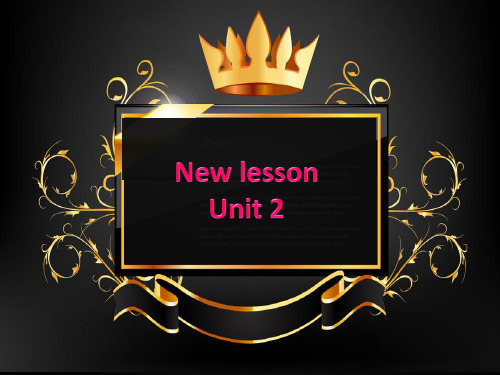
words & expressions
until /ʌn'til/ outside /'aut'saɪd/ ring /rɪŋ/ (rang /ræŋ/, rung /rʌŋ/) aunt [ɑ:nt] repeat /ri'pi:t/
★until prep.“一直到……为止" "在……以前" 我会在这里等到5点钟。 I’ll wait here until 5 o’clock. (延续动词,肯定句) 她到6点才能来。 She can not arrive until 6. (短暂动作的动词,否定句)
dark / raining arrive/ by
/ just then
train
have breakfast
repeat
dear me! on the text
It was Sunday. I never get up early on Sundays. I sometimes stay in bed until lunchtime. Last Sunday I got up very late. I looked out of the window. It was dark outside. ‘What a day!’ I thought. ‘It’s raining again.’ Just then, the telephone rang. It was my Aunt Lucy. ‘I’ve just arrived by train,’ she said. ‘I’m coming to see you.’ ‘But I’m still having breakfast,’ I said. ‘What are you doing?’ she asked. ‘I’m having breakfast,’ I repeated. ‘Dear me!’ she said. ‘Do you always get up so late? It’s one o’clock!’
新概念英语第二册教学大纲

01
教学评估
学生学习评估
评估方式:考试、作业、课堂表现等 评估内容:语法、词汇、听、说、读、写等方面 评估标准:按照教学大纲要求制定评分标准 评估目的:了解学生的学习情况,为后续教学提供依据
教师教学评估
教学目标:评 估教师是否明 确教学目标, 并围绕目标展
开教学。
教学内容:评 估教师是否合 理安排教学内 容,并确保内 容的准确性和
添加标题
第8周:学习新概念英语第 二册第15-16课
第6周:学习新概念英语第 二册第11-12课
每周学习计划
每周学习时间: 建议每天学习 30分钟,每周 学习5天
学习内容:每课 包含课文、单词、 语法、练习等, 按照教学大纲要 求进行学习
学习方式:听录 音、模仿发音、 朗读、背诵、做 练习等
学习目标:掌握 每课重点单词、 语法和句型,提 高英语听说读写 能力
添加标题
添加标题
添加标题
添加标题
教学内容:介绍英语国家的文化 背景、历史传统和社会习俗,对 比中西方文化的差异。
教学评估:通过课堂表现、小组 讨论、跨文化交流实践等多种方 式,全面评估学生的跨文化交流 能力。
01
教学内容
课文学习
课文主题:涵盖日常生活、文化、历史等多个领域 课文难度:适合英语初学者,逐步提高难度 课文长度:由短篇到长篇,逐渐增加 课文类型:对话、短文、故事等多样化
词汇学习
掌握约2000个英语单词 和短语
掌握常用动词、名词、形 容词、副词等词类
学习词根、词缀等构词法, 提高词汇量
了解英语词汇的语境用法 和文化背景
语法学习
掌握基本句型和时态
学习名词、形容词、副词 的用法
了解并列句和复合句的结 构
新概念英语第二册第2课 完整

from time to time 有时候 • almost never;hardly ever;rarely;
scarcely ever;seldom 很少 • not…ever;never 从不
not until...
She didn't go to bed until eleven o'clock. 她直到十一点才上床睡觉。
They didn't find her until the next day. 他们直到第二天才找到她。
• outside /'aut'saɪd/ n. 外面,外部,外观 备注:inside 里边 outsider 局外人
• aunt /a:nt/ n. 姑母,姨母,阿姨,伯母,舅母,舅妈 uncle 叔叔,伯伯,伯父
• repeat /ri'pi:t/ n. 重复 v.重复
He repeated several times that he was busy. Today's lecture was an exact repeat of yesterday's.
Listen to the story and keep these questions in mind.
• What was the weather like last Sunday? • Who was coming to see the writer? • Why was the writer's aunt surprised?
新概念英语第二册第2课

2. Aunt Lucy was surprised because_______
A the writer was having lunch B it was one o’clock C the writer was having breakfast at lunchtime
D it was late
2. Just then, the telephone rang. It rang_______. A at onnt
3. She was his aunt, so he was her_____. A son B grandson C nephew D niece
3. Why was the writer's aunt surprised? Because it was one o'clock, but the writer was still having the breakfast.
Notes on the text
❖ on Sundays—指每个星期日。 ❖ What a day!---此句为感叹句。完整句子为What a day it is! ❖ by train ----介词短语,可以和动词短语take the train进行互换。 ❖ I’m coming to see you.—现在进行时表将来,用现在进行时
Read and answer the questions.
1. What was the weahter like last Sunday? It was bad. It was dark outside. And it was raining.
2. Who was coming to see the writer? His aunt, Lucy.
新概念英语第二册24课课文

新概念英语第二册24课课文【最新版】目录1.新概念英语第二册第 1 课到第 24 课课文概述2.第 1 课到第 24 课课文的内容简介3.作者的写作目的和课文的价值正文一、新概念英语第二册第 1 课到第 24 课课文概述新概念英语第二册是一本适用于英语初学者的教材,旨在帮助学生掌握基本的英语语法和词汇,并培养他们的阅读和写作能力。
该教材共分为24 课,每课都包含一篇课文,以及相关的练习和语法讲解。
二、第 1 课到第 24 课课文的内容简介1.第 1 课:作者描述了自己上周去剧院看戏的经历,但由于周围人的喧哗,他无法听清演员的对话。
2.第 2 课:课文讲述了一个关于企鹅的故事,强调了动物保护的重要性。
3.第 3 课:作者描述了自己的一次旅行经历,讲述了旅行中的所见所闻。
4.第 4 课:课文讲述了一个人如何通过努力学习,最终成为一名成功的商人。
5.第 5 课:作者分享了一段自己在海滩上的美好回忆。
6.第 6 课:课文讲述了一个关于马的故事,描述了马的特性和习性。
7.第 7 课:作者讲述了自己参加一场音乐会的经历,表达了对音乐的热爱。
8.第 8 课:课文讲述了一个关于猫的故事,强调了宠物对主人的忠诚和爱。
9.第 9 课:作者描述了自己在公园里的一次偶遇,讲述了人与人之间的缘分。
10.第 10 课:课文讲述了一个关于狗的故事,描述了狗与人类之间的深厚感情。
11.第 11 课:作者讲述了自己参加一次聚会的经历,表达了对人际关系的思考。
12.第 12 课:课文讲述了一个关于猴子的故事,强调了动物的智慧和适应能力。
13.第 13 课:作者描述了自己在雨天度过的一段美好时光。
14.第 14 课:课文讲述了一个关于鲸鱼的故事,揭示了人类对动物的误解。
15.第 15 课:作者讲述了自己参加一次婚礼的经历,表达了对婚姻的看法。
16.第 16 课:课文讲述了一个关于狮子的故事,描述了狮子的勇敢和威猛。
17.第 17 课:作者描述了自己在乡间度过的一段美好时光。
新概念英语 第二册课文中英对照版
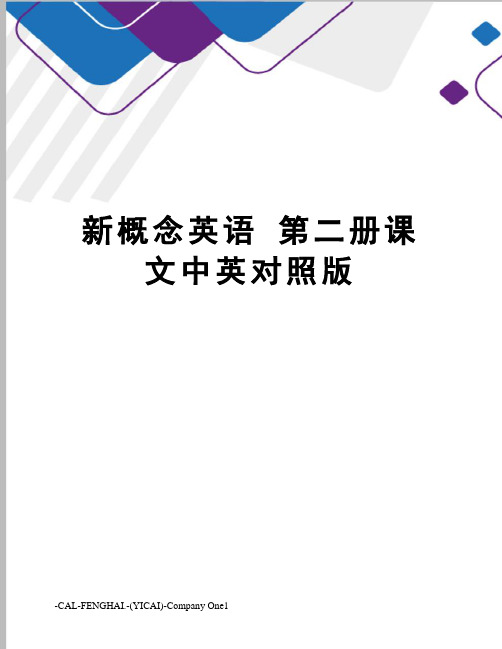
新概念英语第二册课文中英对照版-CAL-FENGHAI.-(YICAI)-Company One1新概念英语第二册课文 1-96课中英对照版Lesson 1 A private conversation 私人谈话Last week I went to the theatre. I had a very good seat The play was very interesting. I did not enjoy it A young man and a young woman were sitting behind me. They were talking loudly. I got very angry. I could not hear the actors. I turned round. I looked at the man and the woman angrily. They did not pay any attention. In the end, I could not bear it. I turned round again. 'I can't hear a word!' I said angrily ‘It’s none of your business,' the young man said rudely. 'This is a private conversation!'.上星期我去看戏。
我的座位很好,戏很有意思,但我却无法欣赏。
一青年男子与一青年女子坐在我的身后,大声地说着话。
我非常生气,因为我听不见演员在说什么。
我回过头去怒视着那一男一女,他们却毫不理会。
最后,我忍不住了,又一次回过头去,生气地说:“我一个字也听不见了!”“不关你的事,”那男的毫不客气地说,“这是私人间的谈话!”Lesson 2 Breakfast or lunch 早餐还是午餐It was Sunday. I never get up early on Sundays. I sometimes stay in bed until lunch time.Last Sunday I got up very late. I looked out of the window. It was dark outside.'What a day!' I thought. 'It's raining again.' Just then, the telephone rang. It was my aunt Lucy.' I've just arrived by train,' she said. 'I'm coming to see you.' 'But I'm still having breakfast,' I said.'What are you doing' she asked. ‘I’m having breakfast,' I repeated.'Dear me,' she said. 'Do you always get up so lateIt's one o'clock!''那是个星期天,而在星期天我是从来不早起的,有时我要一直躺到吃午饭的时候。
裕兴 新概念英语 第二册 Lesson 2 第2课 笔记讲义

直到。
时候till 直到(多用于口语)eg.I sometimes stay in bed until lunchtime.有时候我一直躺倒吃午饭的时间。
The street is full of cars from morning till/to night.这条街上从早到晚的挤满了车辆。
2)conj. 直到。
时候(后面加句子)eg. I stayed in bed until he woke me up. 直到他把我叫醒我一直躺在床上。
I didn’t get up until he woke me up. 直到他把我叫醒我才起床。
until 主句中动词为延续性动词时用untilnot…until 主句中动词为非延续性动词时用 not…untileg. I will wait for you until you come back. 我会一直等到你回来。
I won’t leave until you come back. 直到你回来我是不会走的。
eg. We stayed until the rain stopped. 我们一直等到雨停为止。
We didn’t start until the rain stopped. 直到雨停了我们才出发。
★2.outside n./adj./adv./prep.1) n. eg. the outside of the house 房子的外面2) adj. eg. an outside toilet 户外的厕所outside help 外来的帮助3)adv. eg. It was dark outside. 外面很黑。
Please wait outside. 请在外面等候。
Don’t go outside because it’s too cold. 不要出去因为太冷了。
4)prep. eg. It’s outside my business. 这不关我的事。
新概念英语二第2课

新概念英语二第2课Lesson 2 Breakfast or lunch一:words:1:until=till He is absent until now.He didn’t show up until twelve last night.Lucy didn’t go to sleep until one this morning.They didn’t realize their fault until we pointed out to them.Not until we pointed out their fault to them did they realize it.肯定句:The students made much noise till the teacher came in.The young couple were very happy till they used up all the money.= Until t hey used up all their money ,the young couple were very happy . until 可以放在句首,而till 不可以。
2:outside go/run outside(inside) downsides 消极面adj. The outside parts of some fruits are not good to eat.prep. Outside the house there was a notice saying “for sale”n. The outside of an orange is bitter, but the inside is sweet.adv. The box was red outside and green inside.out:出去。
反义词是in: I was out when you rang me up.out of “从----里面出来”,着重从里到外的动作。
新概念英语第二册第02课
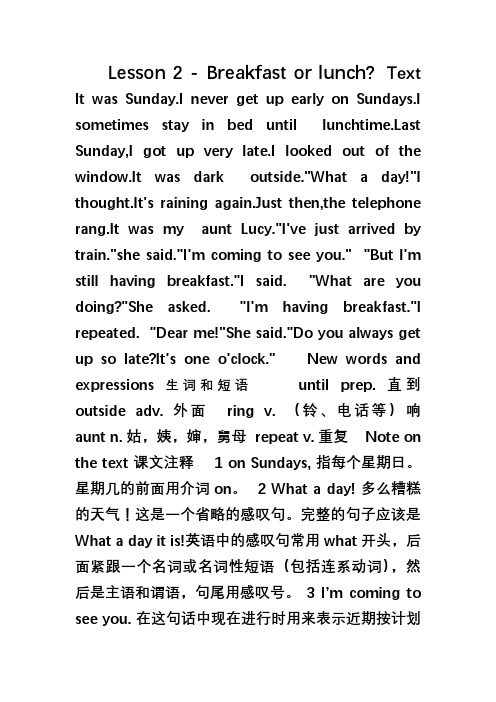
Lesson 2 - Breakfast or lunch? Text It was Sunday.I never get up early on Sundays.I sometimes stay in bed until st Sunday,I got up very late.I looked out of the window.It was dark outside."What a day!"I thought.It's raining again.Just then,the telephone rang.It was my aunt Lucy."I've just arrived by train."she said."I'm coming to see you." "But I'm still having breakfast."I said. "What are you doing?"She asked. "I'm having breakfast."I repeated. "Dear me!"She said."Do you always get up so late?It's one o'clock." New words and expressions 生词和短语until prep. 直到 outside adv. 外面 ring v. (铃、电话等)响 aunt n. 姑,姨,婶,舅母repeat v. 重复Note on the text 课文注释 1 on Sundays, 指每个星期日。
星期几的前面用介词on。
2 What a day! 多么糟糕的天气!这是一个省略的感叹句。
新概念英语第二册第2课课件
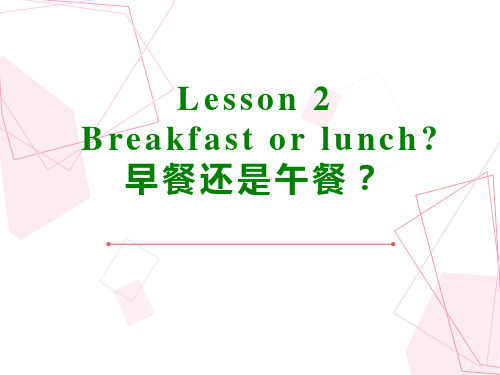
Grammar 现在进行时==》一般现在时
Now:
Often and always:
It's raining.
I never get up early on Sundays.
I'm coming to see you.
I sometimes stay in bed until lunchtime.
"I'm still having breakfast." 7)Was his aunt very surprised or not?
Yes,she was very surprised. 8)What was the time?
It's one o'clock.
Key sentences
He always gets up late. He got up very late last Sunday. His aunt Lucy telephoned then . She dad just arrived by train. She was coming to see him. "I'm still having breakfast." She was very surprised. It's one o'clock.
Complete the passage based on the text !
I'm still having breakfast.
Do you always get up so late?
What are you doing?
I often buy CDs.
She's reading in bed now.
新概念英语第二册第2课课文详解及语法解析

新概念英语第二册第2课课文详解及语法解析1.It was Sunday. 那是个星期天。
在句子中,我们常常用it指时间、天气、温度或距离。
这种it 有时被称为“虚主语” (empty subject),因为它没有实际意义。
它之所以存有,是因为英语句子必须包含主语和谓语。
请注意以下例句:表示时间:It is 8 o'clock.8点了。
表示天气:It's raining again.又下雨了。
It is cold.天气冷。
表示环境:It was dark outside.外面一片漆黑。
作为第3人称单数的中性代词,it能够指一件东西、一个事件或者用来指是什么人:It was my aunt Lucy.是我姑母露西。
(打来电话者)It is a lovely baby.真是个可爱的小宝宝。
2.on Sundays 在星期天的时侯(1)复数形式指每个星期日,或绝大部分星期日,与一般现在时连用,表示经常性的行为:We do not go to school on Sundays.星期天我们不上学。
I never get up early on Sundays.星期天我从来不早起。
(2)介词on一般用于表示某一天的时间短语中:on Monday 星期一on Friday 星期五on Monday morning 在星期一早上on that day 在那一天当我们使用last, next和this, that时,介词(以及定冠词)必须省略:I'll see you next/this Friday.下个/这个星期五再见。
Last Sunday I got up very late.上个星期天我起得很晚。
3.I sometimes stay in bed until lunchtime. 有时我要一直躺到吃午饭的时候。
(1)在表达卧床的意思时bed前不需加冠词:You must stay/remain in bed for another two days.你必须再卧床两天。
- 1、下载文档前请自行甄别文档内容的完整性,平台不提供额外的编辑、内容补充、找答案等附加服务。
- 2、"仅部分预览"的文档,不可在线预览部分如存在完整性等问题,可反馈申请退款(可完整预览的文档不适用该条件!)。
- 3、如文档侵犯您的权益,请联系客服反馈,我们会尽快为您处理(人工客服工作时间:9:00-18:30)。
Lesson 2 - Breakfast or lunch?TextIt was Sunday.I never get up early on Sundays.I sometimes stay in bed until st Sunday,I got up very late.I looked out of the window.It was dark outside."What a day!"I thought.It's raining again.Just then,the telephone rang.It was my aunt Lucy."I've just arrived by train."she said."I'm coming to see you.""But I'm still having breakfast."I said."What are you doing?"She asked."I'm having breakfast."I repeated."Dear me!"She said."Do you always get up so late?It's one o'clock."New words and expressions 生词和短语until prep. 直到outside adv. 外面ring v. (铃、电话等)响aunt n. 姑,姨,婶,舅母repeat v. 重复Note on the text 课文注释1 on Sundays, 指每个星期日。
星期几的前面用介词on。
2 What a day! 多么糟糕的天气!这是一个省略的感叹句。
完整的句子应该是Whata day it is!英语中的感叹句常用what开头,后面紧跟一个名词或名词性短语(包括连系动词),然后是主语和谓语,句尾用感叹号。
3 I’m coming to see you. 在这句话中现在进行时用来表示近期按计划或安排要进行的动作。
4 Dear me! 天哪!这也是一个感叹句。
一、教学重点1、代词:it做虚主语时的用法。
2、时态:一般现在时VS现在进行时。
3、副词:频率副词的排序和位置。
二、课文详注Further notes on the text1、I t was Sunday. 那是个星期天。
这里的it是虚主语,可以指代时间、天气、温度、距离等多种事物,也可以指代某个不确定的人。
接下来课文中还会出现很多个it,让我们来一起看看它到底指代什么。
2、I never get up on Sundays. 在星期天我是从来不早起的。
(1)这是在说我一直以来的习惯,所以用了一般现在时。
(2)never从来不、绝对不。
频率副词,可以用在多种时态中。
例句:-Have you loved me? -Never. -Will you marry me? -Never. 太绝情了!(3)on Sundays 在每一个星期天。
on用在具体的某一天之前,例如on March 21st,on Monday,on Monday morning在这里Sundays用了复数,表示在每一个星期天。
3、I sometimes stay in bed until lunchtime. 有时我要一直躺到吃午饭的时候。
(1)这句话也是一般现在时,表示习惯。
(2)sometimes 有时。
频率副词。
常用于一般现在时。
例句:I usually get up at seven but sometimes at eight.(3)stay in bed 待在床上不起来。
这恐怕是每个人的梦想吧,“赖床”。
stay是个持续性动词。
in bed 在床上睡觉VS 仅仅是陷在床里面in the bed(4)until和till的区别:till只用在肯定句中,until可以用在肯定句或否定句中。
until 用在肯定句中,表示一个动作一直持续到某时。
He stayed in bed until/till lunchtime.用在否定句中,表示直到什么时间才做了某事。
He didn’t get up until lunchtime.例句:Last night I stayed up until/till 12:00. = Last night I didn’t go to bed until 12:00. (5)lunchtime 午饭时间,一般是指11:00~13:00。
4、Last Sunday I got up very late. 上个星期天,我起得很晚。
Get up:起床. 例如:It is time to get up5、I looked out of the window. It was dark outside. 我望望窗外,,外面一片昏暗。
(1)look out 小心,注意。
Look out! There’s a hole in the ground. = Watch out!(2)look out of... 往…的外面看。
←→look into... 往…的里面看。
(3)这里的it也是虚主语,指代天色。
outside是地点副词,作状语。
6、‘What a day!' I thought.‘It's raining again.'“鬼天气!”我想,“又下雨了。
”(1)What a day! 省略式感叹句。
= What a day it is! = What a bad/terrible day it is!来源:It is a bad day. →What a bad day it is!构成:What + 名词(包括冠词和形容词) + 主语代词+ 谓语动词+ !对照:How + 形容词/副词+ 主语(名词/代词) + 谓语动词+ !(2)thought是think的过去式。
(3)It’s raining again. 这里的it也是虚主语,代指天气。
again反映了作者抱怨的情绪。
因为是放在引号里的直接引语,所以用了现在进行时be + doing。
7、Just then, the telephone rang. 正在这时,电话铃响了。
(1)then 然后,那时。
just 就,仅仅。
Just do it! 是NIKE的宣传口号。
just then = at that moment 就在那时(2)ring [vi.] 不及物动词。
The bell rings. The phone rang.ring [vt.] 及物动词。
ring sb. = call sb.8、It was my aunt. 是我姑母露西打来的。
(1)这里的it也是虚主语,代指某个不确定的人。
打电话或敲门时。
例句:-Who’s that? -It’s me, Rita. 【Action:Knock, knock!】不知人的性别时。
例句:-Who’s that baby? -It’s my sister, Alice.(2)Aunt Lucy 称谓可以用在名字的前面。
举例:Uncle Tom,汤姆大叔的小屋。
9、I’ve just arrived by train. 我刚下火车。
(1)这里的just是刚刚的意思,用于完成时。
例句:-Have you finished your homework? -I have just finished it.(2)by +具体的交通工具:by bus/bike/ship/air/plane.... ;on foot10、I’m coming to see you. 我这就来看你。
(1)用现在进行时表将来,表示即将、马上发生的事。
(2)可用于这种情况的词:go,leave,arrive,die等。
(3)例句:I’m leaving now. I’m dying. The train is arriving in five minutes.11、‘But I'm still having breakfast,' I said. “但我还在吃早饭,”我说。
这里的still跟till长得很像,所以still是还、仍然的意思。
吃饭:have breakfast/lunch/supper/dinner/a meal12、‘What are you doing?' she asked. “你在干什么?”她问道。
What are you doing? 非常常用的一句话。
【Action】-Hey, what are you doing here? -I’m reading a book.15、‘I'm having breakfast,' I repeated. “我正在吃早饭,”我又说了一遍。
repeat 重复。
re-是一个前缀,表示“重来,再次”。
例词:recovery 复原;remix 再混合,如歌曲的混音版;remind 再次想起16、Dear me! 天啊!这也是一个感叹句。
= Oh, my God! = My dear! = Goodness! = Good heavens!17、‘Do you always get up so late? It's one o'clock!'“你总是起得这么晚吗?现在已经1点钟了!”(1)always 一直,总是。
频率副词。
常用于一般现在时。
(2)1so late 在这里so是个副词,修饰形容词late。
举例:so beautiful,so much,so clever (3)It’s one o’clock! 这里的it也是虚主语,代指时间。
one o’clock可以连读。
三、总结1、文化背景:早餐breakfast,午餐lunch,早午餐brunch,下午茶afternoon tea。
英国人的早餐很丰富:sausage, egg, bacon, toast, soybean, orange juice/coffee/tea...早起的鸟儿有虫吃:The early bird catches the worm. (早起的虫儿被鸟吃!)2、一般现在时VS现在进行时:※自己造句、从课文中找句子、※顺便复习一下动词的五种形式及其变化规则:3、总结频率副词的排序和位置:排序:always > usually > frequently > often > sometimes > rarely > never位置:一般放在实义动词(谓语动词)之前,非实义动词(be动词、助动词、情态动词)之后,疑问句中一般放在主语之后。
